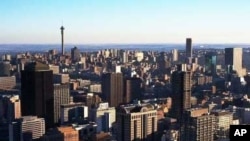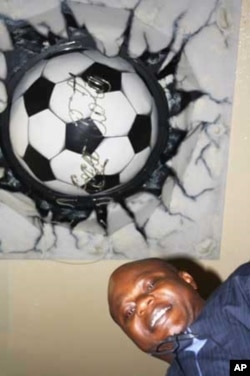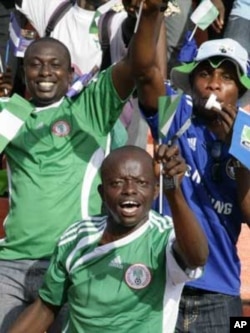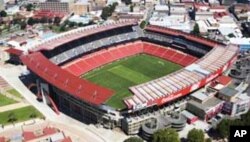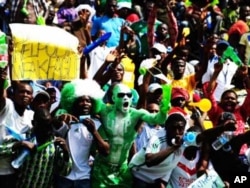Plaster and paint peel from the faded facades of buildings, the structures’ windows long shattered, balconies festooned with clothing drying in the weak winter sun. The tenements drip tears of black moss onto the filthy pavements below, while screaming children play among reeking rubbish overflowing from rusty metal crates into slimy gutters.
When darkness falls, the children’s laughter is replaced by the tumult of bottles breaking in street fights, the anguished cries of women and the wailing of police sirens. Sometimes, gunshots pierce the night, sending the near-naked sex workers and the rats on the crumbling sidewalks scurrying for cover.
Ultimately, everyone here has the same objective - to survive the meanest streets in South Africa. The inner city area of Hillbrow, in Johannesburg, is the football World Cup host country’s most feared suburb. With its massive, seemingly endless blocks of low income housing, it is home to thousands of impoverished African immigrants, the majority of whom are Nigerians.
Bad reputation
Jason Osuafor makes his living in Hillbrow. Here, the Lagos-born property developer rescues buildings that are “falling to the ground” and “gives them dignity.”
“Of course, I need to make a profit, but that’s not my only motive,” Osuafor tells VOA in the tumbledown backyard of one of the apartment blocks he’s renovating. “I don’t want my people to live in dirt. They may be poor, but I want them to be decent.”
His drive to better the lives of Nigerians living in Hillbrow is part of his mission, as president of the Nigerian Union of South Africa, to improve his compatriots’ terrible reputation here.
“In South Africa the word ‘Nigerian’ has become a synonym for the word, ‘criminal’ and it’s so unfair … [because] we [Nigerians] also abhor [crime]; we hate it; we are scared of it!” Osuafor declares.
He says most of the “official” 50,000 Nigerians residing in South Africa are “law-abiding” informal traders and unemployed … But also medical doctors, university professors, engineers and business professionals, like him.
Osuafor maintains that South Africa’s Nigerian community – first established almost two decades ago – deserves its place among its host nation’s diverse population.
“These people, most of them are now here to stay, joining the beautiful configuration of South Africans – whites, Indians, the Chinese, the Zulus, the Xhosas and all (other ethnic groups), to make it happen in Africa,” he says.
However, Nigerians continue to be arrested for crimes – especially drug trafficking and dealing - in South Africa.
“The percentage of Nigerians that commit crime is a very little percentage. I’m not excusing our people who commit crime, though,” Osuafor insists.
Super Eagles are Nigeria's great hope
The entrepreneur welcomes the World Cup – which will kick off in Johannesburg on June 11th – as a “chance for Nigerians here to forget about all their fearsome problems.”
The Super Eagles, as Nigeria’s soccer team is known, are one of Africa’s great hopes at the tournament. Osuafor says Hillbrow will become a “little Lagos; a carnival,” for the month-long duration of the football spectacular.
South African research company Grant Thornton projects that about 15,000 Nigerian fans will jet into South Africa for the Cup. But Osuafor is sure it’ll be “much more” than this.
“Wow, I tell you the truth – Nigeria will be the largest African story in this African World Cup,” he states emphatically.
To back up his claim, Osuafor says he’s spent the past few months getting calls from “countless” people in Nigeria who are planning to attend the event. He says there’s been “great demand” for match tickets from Nigerians, despite high prices. The cost of the cheapest group game ticket for Nigerians is around US$80. Osuafor, however, concedes that should the Super Eagles progress to later rounds, there’ll be “relatively few” Nigerians in the stands. Tickets for the semi-finals, for example, cost between US$250 and US$600.
“Even if Nigerians don’t have tickets, they’ll still join the street parties. They’ve got plenty of friends here,” he laughs, gesturing at nearby buildings and exclaiming, “Accommodation here is cheap!”
Appealing to African gods
Nigeria is drawn to play Argentina, South Korea and Greece in the competition’s group stage. With a brand new coach – the Swede, Lars Lagerbeck, who has only had weeks to prepare his team - the Super Eagles certainly aren’t among the favorites to secure Africa’s first World Cup triumph.
Osuafor says he has a “mixed feeling” about his homeland’s chances, given that it only qualified for the event with a last-gasp victory over minnows Kenya in November last year. “It is a miracle that we are at this World Cup,” he acknowledges. “Nigeria played so badly in the qualifiers that really we have no right to be in the tournament.”
Osuafor’s hoping the “magic” that saw the Super Eagles unexpectedly make the cut endures. For this to happen, he says, young midfielder John Obi Mikel will have to “play like a genius.” But, adds Osuafor, if anyone “has the capacity to perform miracles” it’s Mikel.
Many experts say Nigeria should be content to fight for second place in the group, behind world soccer superpower, Argentina. But Osuafor disagrees.
“We’ve defeated Argentina before – especially in the [1996] Olympics in Atlanta. I wouldn’t think that (the Nigeria team) would think that Argentina is suddenly a mountain,” he says.
On Saturday, June 12, only the second day of the soccer jamboree, one of the World Cup’s most high profile group games happens when the Super Eagles and Argentina clash at Ellis Park stadium in Johannesburg. That’s just around the corner from the Nigerian stronghold of Hillbrow.
“It’s going to be just crazy, crazy,” Osuafor says, shaking his head. “There are about 10,000 Nigerians living within earshot of Ellis Park.”
The majesty of one of the greatest footballers the globe has yet seen, Argentine striker Lionel Messi, and the African hope that Nigeria will pull off an upset, ensured that the match sold out a long time ago. But Osuafor will be there.
“I’m sure that some of our culturally-related people have slaughtered goats and chickens as a sacrifice to African gods to appear that day and make sure we defeat these Argentines!” he laughs.
International mindset shift
As if supernatural African powers aren’t enough for Nigeria’s opponents to overcome, Osuafor says his compatriots have eagerly adopted the vuvuzela – the controversial, noise-making trumpet loved by South African football fans.
“I don’t think South Africans will match Nigerians in the vuvuzela story anymore,” he offers. “Nigeria is now the number one vuvuzela blowing country in the world. We are going to blow those Argentines back to Buenos Aires!”
On June 12, Osuafor predicts, “the whole of Hillbrow will be a big party - beautiful music, wonderful exhibitions; I can’t imagine the kind of [Nigerian] masks I will see that day.”
In the build-up to the World Cup, he says, some Nigerian expatriates have been traveling “in and out” of Lagos to buy masks to wear at matches “to amaze the Argentines, South Koreans and Greeks."
"They will know what it means to be in Africa when they attend a Nigerian game or party,” Osuafor promises.
He stresses the World Cup isn’t just about football – “it’s about expressing African traditions and the African way of doing things.”
Osuafor appeals to African fans to be “as hospitable, friendly and generous as possible” to fans from other parts of the world. If this happens, he says, the World Cup – even if an African team fails to win it – will be a success for the continent “because it will show the world’s billions the great love and respect that exists in Africa, not just the war and corruption and AIDS they see on TV all the time.”
"If this international mindset shift” about Africa takes place," Osuafor continues, "it will represent a true turning point for Africa. And that will be far more valuable than the mere holding aloft of a solid gold trophy by African hands."




